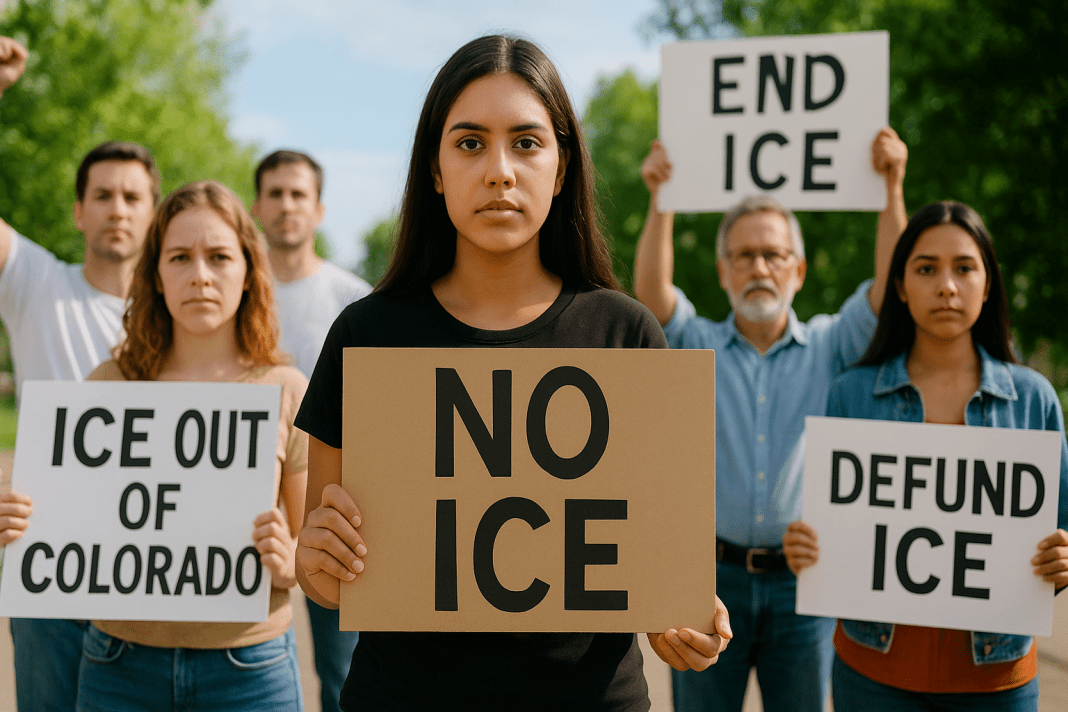The American Civil Liberties Union (ACLU) along with two Colorado law firms have filed a federal lawsuit against Immigration and Customs Enforcement (ICE) on Thursday. The legal groups accuse ICE of carrying out “indiscriminate stops and arrests” across Colorado, putting thousands of people at risk simply because of their appearance, accent, or perceived nationality.
Federal Lawsuit Targets ICE Arrests in Colorado
The lawsuit, filed in federal court in Colorado, claims that ICE agents are targeting individuals without proper evidence or reason, allegedly to meet arrest quotas reportedly set by the Trump administration. The plaintiffs argue that ICE is failing to determine probable cause or assess whether a person is likely to flee before making arrests.
The legal action represents four individuals, including a 19-year-old college student who was brought to the United States as a child. In June, a Mesa County Sheriff deputy stopped her for a traffic-related matter and questioned her about her accent and immigration status, leading to her detention. She spent 15 days in ICE’s detention center in Aurora.
Wrongfully jailed for 40 years, a man tastes freedom for minutes before ICE takes him away
“Our state’s 169,000 undocumented immigrants, along with hundreds of thousands of Latine Coloradans, now live in fear and at daily risk because of federal immigration agents’ indiscriminate practices,” the lawsuit states. “ICE’s arrest scheme is tearing families apart and terrorizing communities.”
The lawsuit names Department of Homeland Security Secretary Kristi Noem, Acting ICE Director Todd Lyons, and ICE Denver Field Office Director Robert Guadian as defendants. The Denver ICE office referred questions to the Department of Homeland Security, which has not yet responded publicly.
ICE regulations require agents to have probable cause to believe someone is living in the United States illegally and may flee before they can obtain a warrant. However, the lawsuit claims that ICE agents carried out the plaintiffs’ arrests without conducting this necessary assessment, causing physical injuries, hunger, and pain during detention.
Personal Stories Show Impact of ICE Arrests in Colorado
The lawsuit outlines several individual cases to show the impact of ICE’s practices in Colorado. Refugio Ramirez Ovando, a 43-year-old father and lawful permanent resident, has lived in Colorado for two decades. ICE agents in unmarked vehicles pulled over Ovando in May while he was on his way to work. They detained him in Aurora for more than 90 days.
ICE agents arrested a 36-year-old asylum seeker on February 5 during a raid at the apartment complex where he had lived for seven years. They apprehended him as he left to go to work at a restaurant and grocery store. He spent four weeks in detention and lost his home as a result. On the same day, ICE agents conducted raids in at least seven other apartment complexes across Denver, Aurora, and Thornton in Colorado. At some locations, agents asked all tenants to provide identification without a warrant.
USCIS reveals 275 cases of suspected immigration fraud in Minnesota operation
ICE agents detained a 32-year-old father and business owner after a raid at a nightclub in Colorado Springs in April. He had been waiting as a designated driver for a friend when agents arrested him. They held him in the Aurora detention center for seven weeks.
The lawsuit emphasizes that these arrests took an emotional and physical toll on the plaintiffs. It states that the plaintiffs and their families feel “devastated by the unlawful captures” and live in constant fear of being separated again.
Class Action and Broader Impact
The lawsuit seeks recognition of the plaintiffs as representatives of a class of people in Colorado who have been or may be arrested without a warrant since January 20, 2025. It asks a federal judge to examine whether ICE’s actions include arrests without a pre-arrest, individualized assessment of probable cause.
The legal filing notes that these arrests have affected individuals across Colorado, including those with work permits, permanent residency, and even U.S. citizenship. During the Trump administration, federal officials reportedly set ambitious daily arrest goals for ICE agents, aiming for a minimum of 3,000 arrests per day. Although the administration later disavowed these quotas after judicial scrutiny, immigration arrests in Colorado quadrupled between January 20 and June 26 this year compared to the same period last year.
Data from ICE shows a notable shift in the people being targeted. Many of those arrested had no criminal convictions, raising concerns about the criteria used for detentions. The lawsuit describes these experiences as part of a broader pattern of enforcement that prioritizes quotas over individual circumstances and legal rights in Colorado.
The case is now pending in federal court in Colorado. It highlights the legal and civil concerns surrounding ICE’s methods, as well as the experiences of individuals and families affected by immigration enforcement actions.

